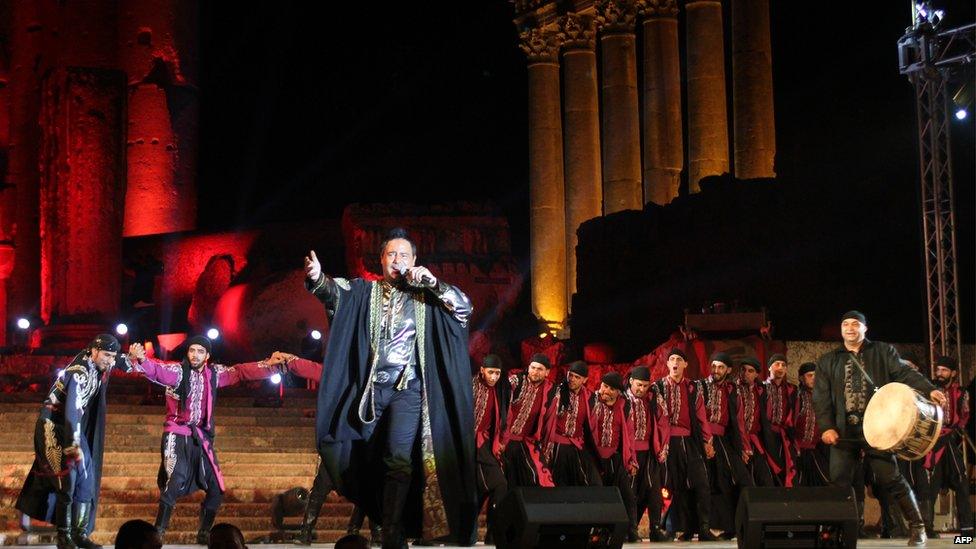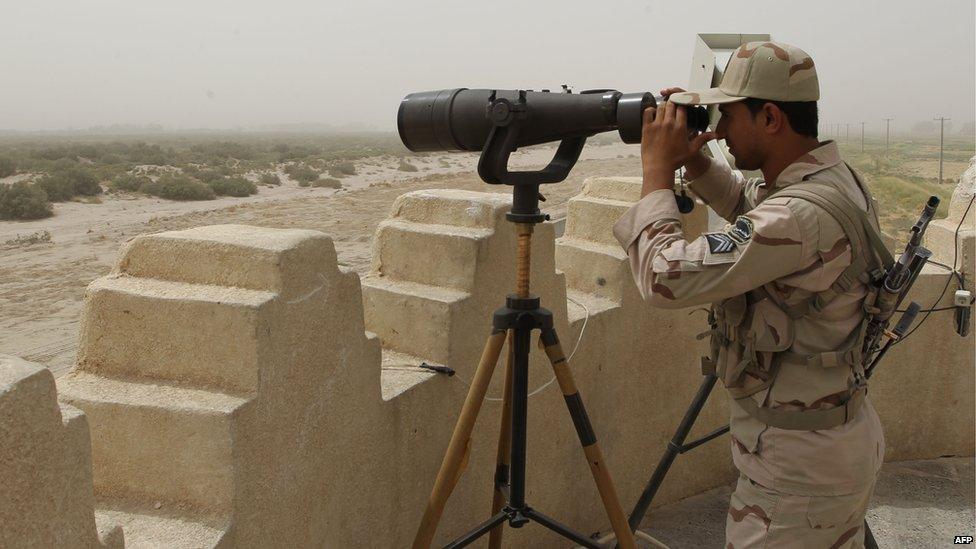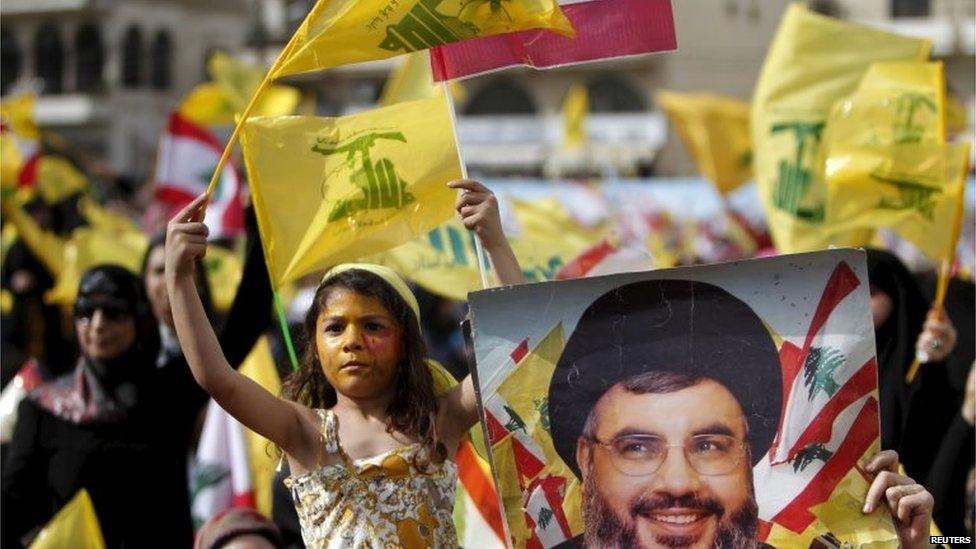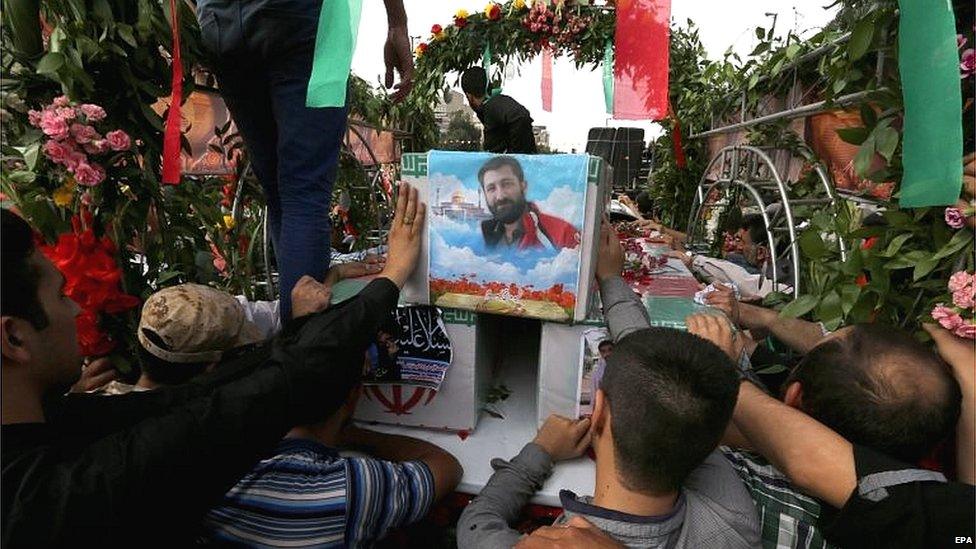Lebanon pivotal to Iran's reach across Middle East
- Published

The Baalbek festival takes place against a backdrop of turmoil and war just across the border
On the road to Baalbek, in the hot afternoons of Ramadan, the Bekaa Valley shimmers in the midsummer sun.
The soaring columns of the ruined temples of Baalbek are one of the glories of the ancient world - but there are few tourists around these days to admire them.
Lebanon's own civil war petered out 25 years ago, leaving tensions smouldering below the surface of daily life. Syria's is raging uncontrollably just a few kilometres up the road.
The town is cradled by snow-capped mountains and surrounded by emerald fields under sapphire skies - but the bewitching quality of the landscape isn't enough to attract visitors in the numbers that Baalbek's economy needs.
Tourists are understandably risk-averse, and the proximity to Syria is enough to deter all but the bravest.
So, not for the first time, Baalbek is hoping that its cultural festival will bring the visitors flooding back. It has worked before.
In the dreary years after the Second World War, the Baalbek festival - held against the spectacular backdrop of the ruined temples - was a sign that better and brighter days lay ahead.
Now, after it was suspended in recent years because of the fighting in Syria, the festival is to open again this summer.
Pragmatic course
It is a fact of political life in this part of the Bekaa Valley that a decision of this magnitude requires the consent of Hezbollah - the powerful Lebanese militia founded and funded by Iran.
Its local dominance indeed may also be a factor in keeping visitors away.
Hezbollah, of course, is heavily committed to the fighting in Syria where it is the most disciplined and effective element in the coalition struggling to keep Bashar al-Assad in power.
Sharmine Narwani: "Nuclear deal or not things will change, understandings have been established"
But even as it is engaged in a vicious civil war with strong sectarian overtones on the Syrian side of the border, it has demonstrated in Lebanon a pragmatic ability to coexist with rival communities in the context of a demographic patchwork which is rather similar to Syria's.
No-one should be under illusions about the nature of that coexistence, of course - most Lebanese assume, for example, that Hezbollah was behind the car bomb that killed the powerful Sunni politician Rafik Hariri in February 2005.
But optimists believe it shows that Hezbollah's sponsor Iran is prepared - to some extent at least - to be flexible and pragmatic about the way it exercises influence in the Middle East.
Hassan Hamad from the Baalbek Municipality told me: "The moderate social policy that Hezbollah follows here helps to keep Lebanon safe from terrorism and from the Syrian war.
"They recognise that Lebanon is Lebanon - it isn't Iran and it isn't Europe."
New 'Cold War'
Now, this all matters because an old order is disintegrating in the Middle East - the order imposed by France and Great Britain on the ruins of the Turkish Empire which collapsed here at the end of the First World War.
The US-led Western Alliance is still a player in the battle for influence now raging but the real struggle is between Shia Islam under Iranian leadership and a grouping of Sunni powers led by Saudi Arabia.

Shia Iran and regional Sunni powers view each other with deep suspicion
In Yemen, Iraq and Syria, their proxies fight each other - you could draw a modern comparison with the Cold War between the United States and the Soviet Union or perhaps more accurately with the division of Europe in Catholic and Protestant camps in the 16th and 17th Centuries.
To some extent, Iran's modern leaders are reviving an ancient Persian appetite for influence in the Arab world. In Beirut, political commentator Charmine Narwani told me that West does not work hard enough to understand the changing Middle East from Iran's point of view.
She says there is resentment in Tehran that the country is always portrayed as a destabilising force with dangerous nuclear ambitions, and points out that Iran is in the frontline of a battle with Sunni extremism which is hostile to the West as well as to Shia Islam.
"Iran is probably Ground Zero - a centre for the fightback against Islamic State and al-Qaeda and Sunni extremists in the region," she said.
"The only boots on the ground fighting this fight in earnest are backed, funded and supported by Iran."
That analysis may underplay the role that the Kurds are playing in fighting Islamic State in Iraq but it does help to explain why everyone in the Middle East is talking about Iran.
State-with-a-state
The US-led Western powers are currently seeking a political deal with Iran in which the lifting of crippling economic sanctions could be traded for some sort of verifiable cap on Iranian nuclear ambitions.
But even as those long negotiations approach what will probably prove to be a protracted end-game, the underlying attitude towards Iran remains one of suspicion.
That is partly, of course, because Iran is a revisionist power which feels it has the right to export revolution.
But it is partly because of the way in which Hezbollah - so pragmatic in Lebanon - has emerged as the cutting edge of Iranian power on a wider stage.
In that role, it has been blamed by the West for bomb attacks against Jewish and Israeli targets as far afield as Bulgaria and Argentina.

Hezbollah, which began as a force against Israel, has grown into a major social, political and military movement
And within Lebanon, Hezbollah may offer a glimpse of how Iran sees the future of the Middle East.
What was created as a vehicle to fight Israeli forces of occupation in Lebanon in the 1980s has grown into a powerful state-within-a-state.
Equipped and funded by Iran, it comfortably outguns the Lebanese Army and has perhaps 25,000 fighters under arms.
The movement has social and political responsibilities, too, in its own areas like southern Lebanon but Iran does not seem to aspire to a Hezbollah takeover of the whole country - partly, at least, because it does not need to.
Nothing can happen in Lebanon unless Hezbollah agrees to it and for now it enjoys many of the advantages of being a state - like possession of a powerful army - without the problems that would come from responsibility for Sunni, Christian or Druze regions.
Strategic vision
It is possible that Iran may hope to create other similar non-state Shia entities elsewhere in the Middle East, especially if old multi-confessional nation-states like Syria and Iraq turn out to have reached the limit of their viability.
It does help to explain why Hezbollah is so important to Iran.
I have heard it argued that Iran's involvement is not really about using Hezbollah to maintain President Assad in power - it is more about keeping Mr Assad in office to maintain the land-bridge through which it supplies Hezbollah in southern Lebanon.

Iran is heavily involved in supporting Syria's regime in the war, seeing Damascus as a critical gateway to Lebanon
At a turbulent time in the Middle East, when it feels like influence is up for grabs, Iran has a strategic vision and it brings to it a sense of purpose and energy which other regional players appear to struggle to match.
So when Baalbek holds its festival this summer, it may feel as it has felt before, like a sign of better days to come in the Middle East.
But make no mistake - this is a time of profound upheaval based on deep rivalries between regional powers like Iran and the Gulf monarchies.
And the changes that will flow from that upheaval are far from over.